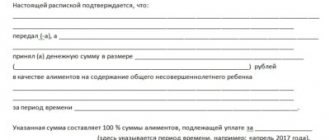A will with a condition is an opportunity not only to distribute valuable property among certain successors, but to impose conditions on the heirs. Sometimes these “reservations” are so onerous that it is easier for the successor to refuse the inheritance than to accept it. In practice, owners rarely make wills with a condition. Some people don't see the need for this. Others think that the heirs will challenge such a document, which means there is no point in drawing it up. In fact, a will with a condition has sufficient legal status if drafted correctly.
What does a will provide?
The order has clear advantages over entering into an inheritance by law
| No. | Advantage | A comment |
| 1 | The document allows the testator to completely change the composition of the heirs | The first applicants are usually the person’s close relatives – father, mother, spouse. You can name a nephew, great-aunt, grandson, or co-founder of a business in your will. Alienation of property to third parties implies the simultaneous elimination of 1st line heirs. An exception may be partial alienation of property. In this case, the relatives inherit the remainder of the assets in order of priority. |
| 2 | A will allows you to determine the type of property that will go to a specific applicant and the size of his share | For example, if there is a lot of property, then you can assign an apartment to your wife, a cash deposit in a bank to your son, or shares to your nephew. Or divide the property between relatives like this: the wife gets ½ of the apartment, and the children get ¼. When drawing up a will with a condition, the testator can kill two birds with one stone - deprive the relative of the inheritance, but also oblige the actual beneficiary to perform certain actions in relation to the eliminated applicant. |
| 3 | A will can be changed, supplemented or annulled | The testator has this right throughout his life. The procedure for making amendments is established by Article 1130 of the Civil Code of the Russian Federation. The testator only needs to contact a notary to make the appropriate order or draw up a new document. The consent of third parties is not required. It is not necessary to explain to the notary the reasons for your decision. |
| 4 | The heir does not need to prove relationship with the deceased citizen | In practice, problems with documents arise quite often. If it is impossible to obtain a duplicate, the heir will have to go to court. |
| 5 | The owner can establish a condition that the legal successors are required to fulfill. | Failure to comply will result in loss of property. The rule on obtaining a testamentary refusal is valid for 3 years. If the beneficiary does not exercise this right, the heir is released from fulfilling the terms of the will. The exception is the presence of an additional legatee. The testator can appoint it in case of refusal or death of the main applicant. |
Basic concepts of inheritance law
According to the legislation of the Russian Federation, inheritance of property can occur by law (only by relatives) and by will.
A will is a unilateral transaction concluded by the testator. It has a number of characteristics:
- Personal character. A will is written personally by the testator in accordance with his will.
- Freedom of will. The testator has the right to appoint any citizens (physical and legal) as heirs, oblige the heirs to fulfill certain requirements (for example, donate a certain amount from the inheritance to an orphanage), and appoint a second heir in the event of illness and death of the first heir.
- The secret of the will. Information about the circle of heirs and share distribution is not disclosed until the opening of the will (after the death of the testator), and if the document is closed, then the information is not disclosed at all. Each heir learns only about his share.
- Form. Like any transaction, a will must be drawn up as the sample instructs, otherwise the paper will not have legal force. A sample is usually issued by a notary when a document is written and certified.
- Heirs who may be unworthy still have a chance to receive their share of the inheritance: the testator can “forgive” unworthy heirs in the text of the document.
Of course, knowing the laws, the testator can distribute his property among the heirs in any shares, taking into account all the nuances.
In addition, the testator has the right to change or completely cancel the will and write a new one. However, such opportunities leave room not only for the activities of the testator himself.
Is it possible to specify conditions in a will?
The legislator has provided for the possibility of drawing up a will with a condition.
Condition options:
- testamentary refusal (fulfillment of a property-related obligation);
- testamentary assignment (fulfillment of a property or non-property obligation aimed at generally beneficial purposes).
Providing a room in the testator's apartment for his mother to live in is a testamentary refusal, and taking in his animals is an assignment.
Important! The testator's demands must not go beyond the law. Otherwise, such an order may be declared invalid.
Example. Citizen K. made a will. The document stated that his son was entitled to a share of the property if he turned 18 years old at the time of opening the inheritance. If the child does not reach the age of majority on the day of the father’s death, then the property goes to his mother.
As you can see, the testator’s condition is related to objective events. There are no grounds for challenging such a will.
Example. Citizen K. made an order. The property was to go to his daughter. The condition for entering into an inheritance is obtaining a higher education. The condition is suspensive. Several years may pass between the opening of an inheritance and receiving a diploma. Therefore, the testator can appoint an executor of the will, who will ensure the safety of the property until the specified event occurs. The executor may be a wife, brother, or legal entity.
Can applicants refuse inheritance?
Acceptance of an inheritance is not an unconditional requirement of the law. Applicants may waive their rights for various reasons (Article 1157 of the Civil Code of the Russian Federation). Among them:
- the property is located far away (different region);
- the heir's share is insignificant;
- the possibility of a conflict with the relatives of the testator;
- the inheritance is of no value to the applicant;
- the presence of debt obligations on the part of the testator.
Another reason for not accepting an inheritance is missing deadlines for filing documents. For example, the heir did not know about the death of a citizen or was outside the country/region.
Of course, the testator may not think about the future fate of the property. However, it is better to appoint an heir. Especially if the owner does not want his property to be transferred to the claimants by law.
What conditions can be included
Applicants may be assigned the following responsibilities:
- Transfer to the legatee the assets or property rights included in the inheritance.
- Perform certain work or provide a service for the beneficiary.
- Make regular payments in the interests of a specific entity.
- Provide residential premises for the duration of the life of the legatee for living. The duration of the condition may be limited in the will.
- Keep animals and care for them.
- To get higher education.
- Get married.
An additional condition may be that the heir reaches the age of majority. For example, you can only withdraw money from a bank if you are 18 years old .
Will with the condition of lifelong residence
One of the conditions of the testator is to provide residential premises to the legatee (Article 1137 of the Civil Code of the Russian Federation).
Basic conditions:
- You can use the right within 3 years ;
- a citizen who has moved into the premises by testamentary refusal may require state registration of the right to use the housing;
- The responsibilities for maintaining the housing are borne equally by the owner and the user (Article 33 of the Housing Code of the Russian Federation).
- If the order specifies a fixed period of use of the premises, then after its expiration the legatee is obliged to vacate.
What should an heir do if the legatee is not a member of his family? The following options are possible:
- the heir provides residential premises for the legatee to live, while he himself lives in another place;
- the beneficiary submits to the notary a waiver of the right to use the housing by agreement with the heir.
Important! The document will need to be certified by a notary. Otherwise, the successor will lose rights to the inherited property.
Form
Mandatory document details:
- place, date of registration;
- document's name;
- registration address of the testator;
- passport details of an individual;
- the essence of the order;
- list of alienated property;
- register of applicants, their residential addresses;
- size of shares of beneficiaries;
- a condition that the heirs must fulfill;
- form number;
- mention of payment of the fee;
- signature of the testator, transcript of the surname.
Each notary usually has a sample order. However, the testator can offer his own version of the document. The notary must check it for compliance with the law.
After reviewing the final version of the will, the testator signs it in the presence of a notary. After which a notarial inscription is made on the document. One sample is given to the testator, the second remains in the notary's file.
Content
This part of the will is one of the key ones.
The testator must indicate:
- personal data;
- composition of applicants;
- list of property;
- clearly describe the condition that he imposes on the heirs.
Example. I bequeath a residential building, which is located at the address (specify the city, street, house number, apartment), to my daughter. If the property is sold, the heiress must pay half of the inventory value to my son. Also, my daughter must transfer my car (model, make) to her sister (full name of the legatee). I bequeath the cash deposit in the bank (name, location, account number) to my grandson (full name). The condition for payment is that the person reaches the age of majority.
Sample
Sample order with condition
Expenses
For notarization of a document, the testator must pay a state fee. Its size is 100 rubles. (Article 333.24 of the Tax Code of the Russian Federation).
Notary services are paid separately. Their cost depends on the region where the notary’s office is located.
Tariffs can be viewed on the website of the Federal Notary Chamber. In 2020, in St. Petersburg the cost of a will is 1,700 rubles, in the Belgorod region - 1,900 rubles, in the Kaliningrad region - 1,400 rubles.
Use of residential premises by testamentary refusal
After receiving a notarial certificate for the re-registration of property rights to real estate, the heir applies to Rosreestr to obtain a certificate of ownership (or an extract from the Unified State Register of Real Estate). This document makes it possible to fully dispose of the property, up to its alienation.
If a testamentary refusal provides that third parties have the opportunity to live on the territory of a specific property, then the heir’s right to dispose of the property is limited.
As for the use of real estate, both the heirs and the legatee can equally use the property, live on it, and take part in its maintenance. The legatee does not have the opportunity to dispose of the property, register other participants in the house/apartment, or limit the heir’s ability to use the property.
Terms of use
The duration of a testamentary refusal depends on the terms of the will. The testator may indicate that the legacy has a limited duration. In this case, the right of the legatee to reside on the territory of the real estate ends along with the designated period.
If the will does not contain an indication of the terms, then the testamentary refusal is considered to be valid indefinitely.
Responsibility for obligations
In case of failure to comply with the conditions stipulated by the will, the heir may be deprived of the right to inheritance. On the other hand, the heir has the opportunity to forcibly evict the legatee from the home if there are good reasons for this. The list of grounds is provided for in Article 35 of the Housing Code of the Russian Federation.
The decision on forced eviction is made in court.
Execution order
Expert opinion
Stanislav Evseev
Lawyer. Experience 12 years. Specialization: civil, family, inheritance law.
The responsibility for executing the order lies with the beneficiaries. If these persons evade their duties, they can be held accountable. For example, a legatee may file a claim to compel the execution of a will.
To avoid problems, the testator can appoint an executor of the will (Article 1134 of the Civil Code of the Russian Federation). The powers of the executor are confirmed by the relevant certificate and follow from the text of the administrative document.
Responsibilities of the executor of a will:
- Ensuring the safety of the testator's property. The necessary actions are carried out through a notary.
- Receiving money from third parties for subsequent transfer to heirs.
- Ensuring the transfer of property rights to the heirs in accordance with the last will of the deceased citizen.
- Conducting cases related to the execution of orders in government agencies or in court.
The executor has the authority to require the beneficiaries to execute the will. If necessary, he can file a claim.








